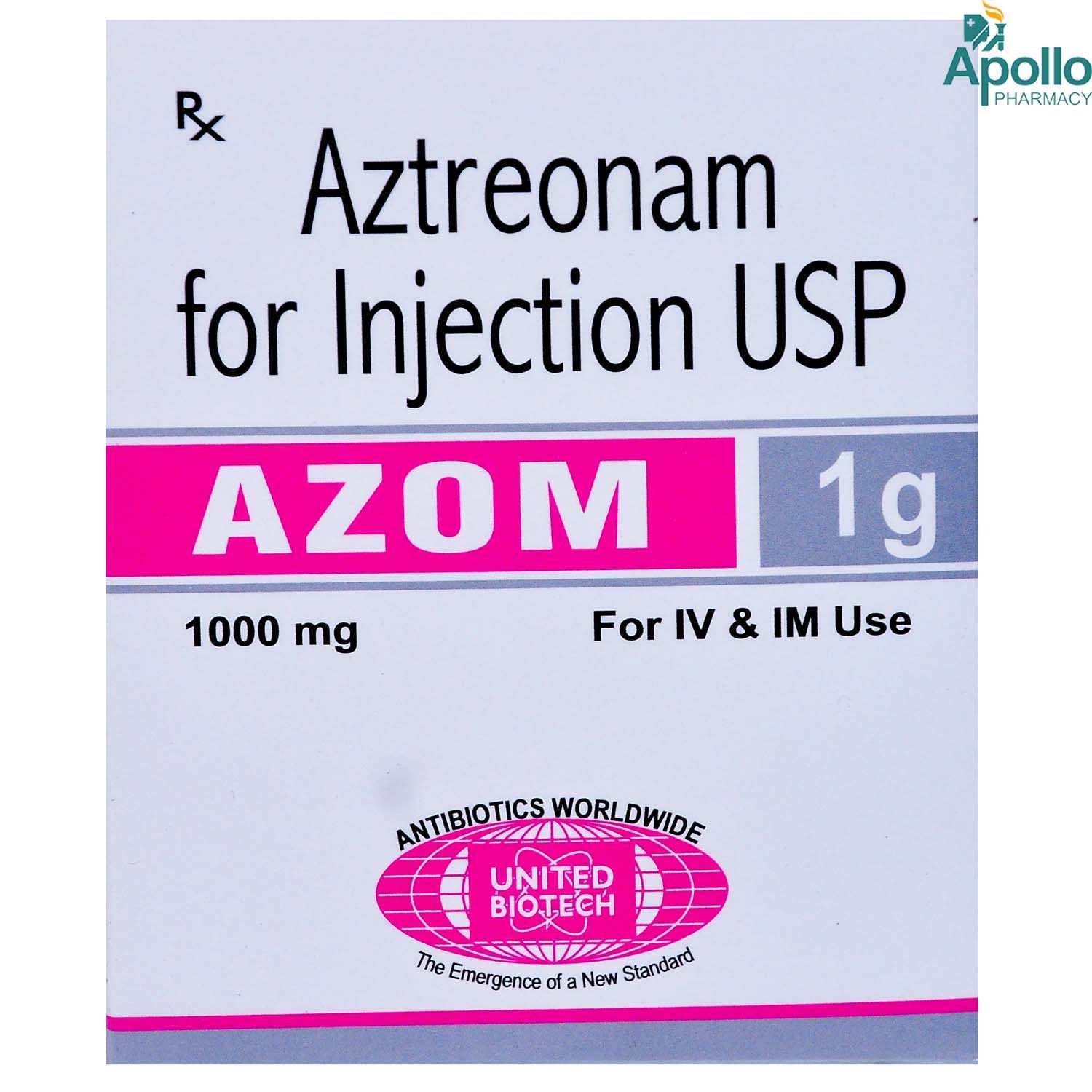Treobact 1000 Injection 1's
MRP ₹1780
(Inclusive of all Taxes)
₹267.0 Cashback (15%)
Provide Delivery Location
Online payment accepted
 Prescription drug
Prescription drugWhats That
Composition :
Manufacturer/Marketer :
Consume Type :
Expires on or after :
Return Policy :
About Treobact 1000 Injection
Treobact 1000 Injection belongs to a class of antibiotics used in the treatment of serious bacterial infections. A bacterial infection is a condition in which harmful bacteria grows in the body and causes infection. It can infect any part of the body and multiple very quickly.
Treobact 1000 Injection contains aztreonam, which belongs to a class of monobactam antibiotics. It works by inhibiting the formation of the bacterial cell wall (a protective covering) that is necessary for their survival.
Some common side effects of Treobact 1000 Injection include dizziness, bad breath, headache, sneezing, high temperature, bleeding of the stomach, double vision. These side effects are not familiar to everyone and vary individually. If you notice any side effects that are not manageable, please consult your doctor.
If you are known to be allergic to Treobact 1000 Injection or any other medicines, please tell your doctor. Do not receive Treobact 1000 Injection if you are pregnant or breastfeeding. Consult your doctor immediately if you notice signs of allergic reaction such as swelling of the face, lips, throat, and/or tongue with difficulty in breathing after receiving Treobact 1000 Injection.
Uses of Treobact 1000 Injection
Directions for Use
Key Benefits
Treobact 1000 Injection belongs to the class of monobactam antibiotics. It reduces the infection by inhibiting bacterial growth. It kills the bacteria by disrupting the formation of the cell wall. It irreversibly binds to the proteins in the bacteria that are essential for the formation of the cell membrane.
Storage
Drug Warnings
Regular monitoring of kidney and liver functioning is recommended while taking Treobact 1000 Injection. If you are a breastfeeding or pregnant woman, please consult a doctor before taking Treobact 1000 Injection. If you notice blood in stools or have severe stomach pain with diarrhoea, contact your doctor immediately. Inform your doctor before taking Treobact 1000 Injection if you have liver problems, kidney problems, blood disorders, fits. Also, inform your doctor if you are already taking medicines like antibiotics or oral anticoagulants.
Diet & Lifestyle Advise
- Take probiotics after completing the full course of Treobact 1000 Injection to restore some healthy bacteria in the intestines that may have been killed. Taking probiotics after antibiotic treatment can reduce the risk of antibiotic-associated diarrhoea. Certain fermented foods like cheese, yoghurt, kombucha, sauerkraut and kimchi can help to restore the good bacteria of the intestine.
- Include fibre rich foods, as they can be easily digested by your gut bacteria, which helps stimulate their growth. Thus, fibre rich foods may help restore healthy gut bacteria after a course of antibiotics. Whole grains such as whole-grain bread, brown rice should be included in your diet.
- Make sure you drink plenty of water or other fluids every day while you are taking Treobact 1000 Injection.
Side Effects of Treobact 1000 Injection
- Dizziness
- Chest pain
- Headache
- Double vision
- Bad breath
- Vaginal irritation
- Blocked nose
Habit Forming
Therapeutic Class
All Substitutes & Brand Comparisons
RX
Out of StockAnam 1000mg Injection
Oscar Remedies Pvt Ltd
₹543
(₹488.7 per unit)
69% CHEAPERRX
Out of StockAztreorid 1000mg Injection
Ikon Remedies Pvt Ltd
₹545
(₹490.5 per unit)
69% CHEAPERRX
Out of StockAzection 1000mg Injection
Biophar Lifesciences Pvt Ltd
₹600
(₹540.0 per unit)
66% CHEAPER
FAQs
Drug-Drug Interactions Checker List
- WARFARIN
- ENTECAVIR
- CHOLERA VACCINE
- PEMETREXED
- DICUMAROL
Disease/Condition Glossary
A bacterial infection is a condition in which harmful bacteria grows in the body and causes infection. It can target any part of the body and multiple very quickly. Bacteria come in three basic shapes namely spherical, rod, or spiral-shaped. Bacteria may be gram-positive (have thick cell wall) or gram-negative (do not have cell wall). Appropriate tests are done to identify bacterial strains and based on the results, proper medication is prescribed. Some common symptoms of bacterial infection include cough, fever, and tiredness.

Have a query?
Alcohol
Safe if prescribed
The interaction of alcohol with Treobact 1000 Injection is unknown. Please consult a doctor before consuming alcohol while using Treobact 1000 Injection.
Pregnancy
Consult your doctor
The safety of Treobact 1000 Injection in pregnant women is unknown. Therefore, it is given to pregnant women only if the doctor thinks the benefits outweigh the risks.
Breast Feeding
Consult your doctor
Treobact 1000 Injection is excreted in human milk. Therefore, it is given to breastfeeding mothers only if the doctor thinks benefits are greater than risks.
Driving
Safe if prescribed
Treobact 1000 Injection cause double vision, dizziness as a side effect. So, avoid driving after receiving Treobact 1000 Injection.
Liver
Consult your doctor
Take Treobact 1000 Injection with caution, especially if you have a history of Liver diseases/conditions. The dose may be adjusted by your doctor as required.
Kidney
Consult your doctor
Take Treobact 1000 Injection with caution, especially if you have a history of Kidney diseases/conditions. The dose may be adjusted by your doctor as required.
Children
Safe if prescribed
Treobact 1000 Injection can be given safely to children, dose to be adjusted and recommended by a child specialist only.
















